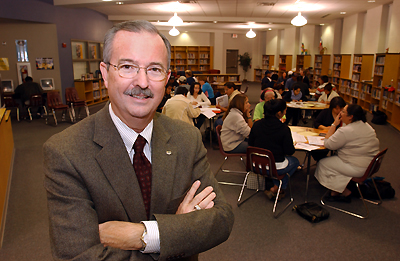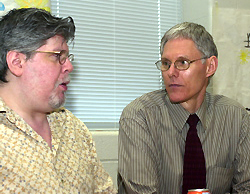Branching Out
On the evening of Sept. 4, 2003, Randy Wood and a dozen student volunteers from Baylor's School of Education stood expectantly in the lobby of César Chavez Middle School. It was the first night of a literacy program the group was offering to parents of students at the school. They hoped not only to teach English but to create a bridge between the mostly Hispanic, Spanish-speaking community and the South Waco school. As they waited, they squinted through a cascading autumn downpour, wondering if anyone would come.
"It was the most wonderful thing when the parents opened the door and their children began to introduce us: 'This is my mother. This is my teacher.' It was a wonderful way to tie American education to positive roles for these parents who didn't really understand what it is all about," says Wood, professor of curriculum and instruction in the School of Education and liaison for Baylor at César Chavez, one of several Waco Independent School District professional development schools with which Baylor is associated. "We had about 30 people that first week."
From that humble beginning, the adult literacy program that now is called Learning English Among Friends truly has branched out in many exciting directions. In one year's time, LEAF has:
- grown to include 260 registered participants;
- by request, been opened to the community at large;
- added GED and computer skills classes;
- added a reading enrichment component for children age 4 through grade 4;
- added crafts and age-graded recreational activities for all children 4 years and older;
- added a reading-at-home component for parents and children;
- begun a Cool Math Literacy program;
- offered LEAF to Hispanic employees of Crothall, Baylor's housekeeping vendor;
- initiated other programming through Baylor's School of Social Work to assess community assets for future leadership development; and
- received a number of grants and donations.
Wood and Rob Rogers, associate professor in Baylor's School of Social Work and co-coordinator of the LEAF program, are delighted with the ways the programs have been received. "People have said, 'I've been to other programs, but the reason I stay here is that it's a small group and the people care about us,'" Rogers says. "They get a sense that there's something more here than just 'Come learn English.' I think that comes from Randy and me and others seeing this as a ministry that's infused with goals. We think this is the spirit of the Lord at work in many ways."
In the spring, the two received requests that the program be offered this fall in several other area middle schools, including all in Waco ISD and in LaVega and McGregor. "It is absolutely a 'God thing,'" Rogers says.
The first sprout
Before the adult literacy program, Wood began a tutoring program in 2001 for the children at César Chavez through his education courses. He and his Baylor students worked with the lowest-achieving students at the 90 percent Hispanic school. When the Texas Assessment of Knowledge and Skills scores came back later that year, Wood noticed that 80 percent of the middle school students passed the reading assessment for the first time.
"We certainly don't want to take all the credit for it, but I think the ability to bring students that were not passing the state-mandated test to passing makes a significant difference in the way that the school was performing," he says.
They soon realized, though, that the children's difficulty with language was symptomatic of a larger problem. "We discovered that within a 40-block area of the school, there were about 500 people who couldn't read, write or speak English," Wood says. "We thought maybe we needed to find another way to reach these families and these kids."
Wood and Rogers spoke with the Community Decision Making Council at César Chavez about offering adult literacy tutoring, and they received an enthusiastic response from the group, which consists of school administrators, parents and business people from the community. Wood says parents he spoke to told him, "We need to know English so we can communicate with our children better, so we can get better jobs and be more a part of the community." Wood immediately enrolled in training to become an English as a Second Language teacher.
The two men already were in the process of developing a replicable literacy program (what became known as LEAF) for churches to use to involve the whole family in a secular setting. It was a project for Baylor's Baptist Literacy Missions Center, founded in 1989 in conjunction with the Baptist General Convention of Texas and housed on Baylor's campus, across from the Bobo Baptist Student Center. The BGCT also provided the seed money to underwrite the study that developed the family literacy program.
For 50 years, the Literacy Center has been a clearinghouse for information and has trained numerous church laypeople statewide on how to start literacy programs in their congregations. In summer 2003, the two professors decided to implement the family literacy program at César Chávez, which expanded their vision to providing literacy training by Christians in a secular setting.
Thursday nights at Chavez
A typical Thursday evening finds Wood and Rogers supervising about 40 adults and 20 tutors seated at round tables in the school's library. The tutors have completed 16 hours of training in teaching ESL, which is provided through the Literacy Center. Participants first are tested using the Basic English Skills Test and then placed in groups according to ability. They spend 90 minutes weekly working on English vocabulary, grammar and syntax. Participants are retested quarterly to gauge progress. After studying, families enjoy a dinner in the cafeteria, sponsored by GEAR UP Waco (Gaining Early Awareness and Readiness for Undergraduate Programs), a federal grant program started in 1999 to facilitate student participation in undergraduate programs.
"Nobody's dozing, nobody's glancing around. They come to learn," Rogers says. "We regularly have complaints that we have to stop after an hour, and that's always a good sign in education."
Three weeks into the program, others in the community -- those whose children weren't attending Chavez -- asked if they could participate, so LEAF was opened to the public. People started bringing their younger children with them, so Wood enlisted YMCA volunteers to provide child care for kids in the gym. Then, at the request of the adult students, LEAF partnered with McLennan Community College and GEAR UP Waco to offer GED and computer skills classes, which are held after the family mealtime.
César Chavez Principal Alfredo Loredo has been integral in making LEAF possible. "Schools can no longer be separate entities, they have to be collaborative," Loredo says. "What you see today are the fruits of so many laborers. For the benefits that we're getting out of it, the costs to keep the school open are nothing."
GEAR UP Waco provided funds to purchase the Oxford University Press texts that are used in the LEAF program. The workbooks are designed to expose students to vocabulary and American culture and contain illustrated units on everyday topics such as visiting the doctor, job situations, parenting and shopping. "What we're aiming for here is contextual education. The Oxford material makes it relevant to their life," an ingredient that, along with a caring environment, is essential for retaining students in the program, Rogers says.
Elizabeth Terry, a senior education major in the Honors College, has volunteered with LEAF since the program started. She began a literacy program in September for children age 4 through fourth grade whose parents are in the LEAF program. She says the children's learning reinforces what their parents are studying. "If the adults were given a pre-primer reader, they might not take it so well, but if they're reading with their children, that's something they'd be more than happy to do," she says.
To further reinforce the family approach, LEAF began offering a program called Parent and Child Together Time (PACTT). Following the weekly study time at school, parents commit to spend an hour each week outside of class reading with their children.
"Every week, it's an adventure to see what the Baylor student volunteers are going to bring to make the lessons more interesting and relevant," Rogers says. "They're paying attention to individual needs and learning styles of the students, and that comes across."
The tutoring gives the college students valuable real-world experience, Wood says. "I believe the opportunities that we're providing here for these students give them so much broader of an understanding of what education is all about. They now see the family unit, and what a difference it makes if they can get parents' support and excitement about education. Teaching is not just to pass along book knowledge; it is being a part of real life."
The integration of all of these programs -- adult ESL, math literacy, social work home visits, reading enrichment for primary school children, recreation, child care and a family meal -- as a broad-based family literacy program in middle school is rare, Rogers believes. "It is a model tailored to the community in which it is located and from which we can learn lessons that may apply elsewhere," he says.
Others becoming involved
Other organizations have expressed an interest in bringing a LEAF program on site. A coalition of local businesses that employs Hispanic workers has formed and will be implementing a literacy program to help their employees excel in the workplace. Crothall, Baylor's housekeeping vendor, has identified 40 employees who want to improve their English skills and will begin LEAF at Baylor with the help of Student Government and student tutors. LEAF expanded to Carver Middle School, also in Waco ISD, this past year.
Students from the School of Social Work fulfill field education requirements by encouraging parents who are not involved in the LEAF program to engage in their children's learning and overcome barriers to their own education. Also, they perform asset assessments to determine the strengths of the community where LEAF participants live. "There is a lot of natural leadership in this community," Rogers says. "As much as we care about them and the community, we're not going to be the sole leaders of this. So it's important for us to identify people who are natural leaders and then help equip them, bringing resources together."
Rogers says that while teaching is the focus of the program, Baylor's social work students interact by strengthening, enriching, linking and advocating for the families and children in the community. "These are areas where we can focus to complement the instruction of the education students," he says.
Local charitable foundations have provided grants to support LEAF, and collaboration among community groups continues to expand. Rogers says he hopes it develops into "a seamless continuation of service to these families."
Wood and Rogers agree that LEAF is meeting its goal to reach the people of South Waco. "It all boils down to the people. That's what we're here for," Wood says. "These are wonderful people who love their families and want to provide more for them. We want to help them better provide for their families."

